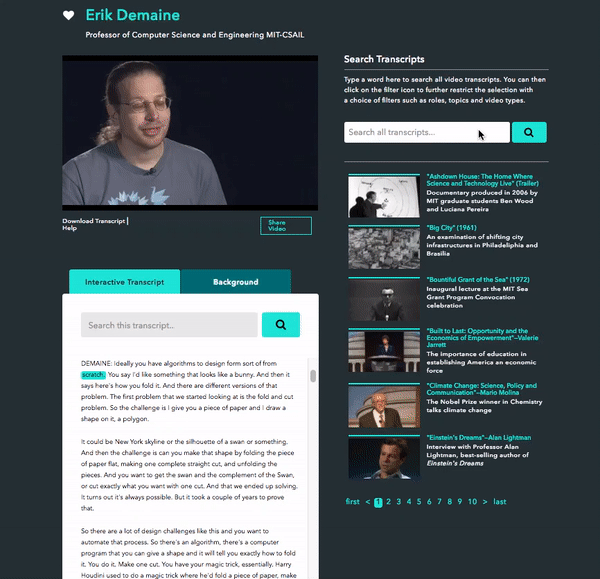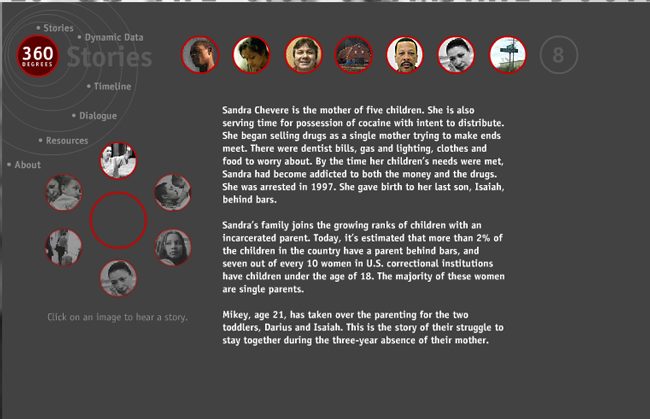5 Oral Histories Doing Captioning Right
Updated: November 29, 2023
Oral histories are timeless resources that paint a picture of the real human experiences and emotions of past events. In this blog, we cover 5 examples of oral history project who are using captioning to engage their audience in new ways.
The stories captured through oral history projects are incredibly important. They serve as resources for both education and research. So why shouldn’t we caption them?
Captioning and transcribing oral histories helps reach wider audiences. It makes your videos accessible to the d/Deaf and hard of hearing, as well as people who speak English as a second language.
Not only does captioning bring greater access, it also helps engage viewers and makes your content easier to share and discover.
1. Infinite History
Whether you attended MIT or not, you can relive the commencement speeches from President Bill Clinton’s speech in 1998, or Vice President Al Gore’s speech in 1996.
You can also hear lectures from Steve Jobs or attend Sir Winston Churchill’s “rousing keynote address.”
But what makes this website even greater is the fact that it is fully interactive and searchable – all thanks to captions.
Using interactive transcripts and playlist search, users can search for keywords within a video – or within the whole library of videos – then jump to the spot in the video where the keyword appears. Viewers can also follow along with the video via a transcript.
The Infinite History site shows the value that captioning can bring to your content. When you have such a rich library of content, adding features like the interactive transcript and playlist search infinitely improves the user experience.

A study by the University of South Florida St. Petersburg revealed:
- 1. Students want closed captioning and find it helpful.
- 2. Students who worked with interactive transcripts found them particularly helpful.
- 3. Both closed captioning and interactive transcripts made a difference in student learning.
2. Densho
As a reaction to Pearl Harbor in 1942, around 117,000 Japanese Americans were relocated to internment camps around the country – against their will. Most were of American citizenship and had never been to Japan, but it didn’t matter.
It took 3 years for the camps to be shut down, but for the years that followed, there was still high hostility against Japanese Americans.
Densho uses historical footage and interviews with survivors to educate the public on one of the most shocking episodes of American history.
Densho’s remarkable collection of stories are also all captioned. As Densho puts it, “Adding Closed Captions to Densho’s videos makes it possible for us to reach an even wider audience including the hearing impaired.”
Many videos come with transcripts so viewers can take the stories with them and easily share them with others.
Densho also plans to use their closed captions to translate their content into other languages, helping to share their powerful collection of stories with an even wider audience.
3. StoryCorps
Anyone can participate – that’s the beauty of the project. Everyone has a story to share, and StoryCorps gives them the chance to tell it.
Stories are short, diverse, and full of wisdom and real moments. In addition, every story has an accompanying transcript for readers to browse, read, or download.
4. Fortunoff Video Archive
The Holocaust was one of the most barbaric episodes of human history, whose bruises continue to wound those affected.
Because of the millions of lives lost, it’s so important to preserve the stories of the survivors. Capturing these stories helps honor the lives of those affected by this brutal event while helping others understand and bear witness to the injustices and effects of the past.
The goal of this vast library is to “serve as a resource for other projects working to record witnesses to the Holocaust and other twentieth-century genocides.”
As a result, they provide open captions on their videos, making it easier for viewers to truly engage with the content.
5. 360 Degrees

Stories are focused on a specific case and told from the perspective of the person involved. According to the site, while the crime rate is down, the criminal justice system is expanding. The goal of the project is to shed light on “who is in prison today and why” to hopefully start conversations on ways to reduce crime and strengthen communities.
The 360 Degrees website houses a plethora of resources for those wanting to understand the crime system better. Since stories are recorded, the website provides a transcript of the recording, as well as photos, diaries, and other helpful resources that help paint a picture of those affected by each case.
Further Reading

Subscribe to the Blog Digest
Sign up to receive our blog digest and other information on this topic. You can unsubscribe anytime.
By subscribing you agree to our privacy policy.






